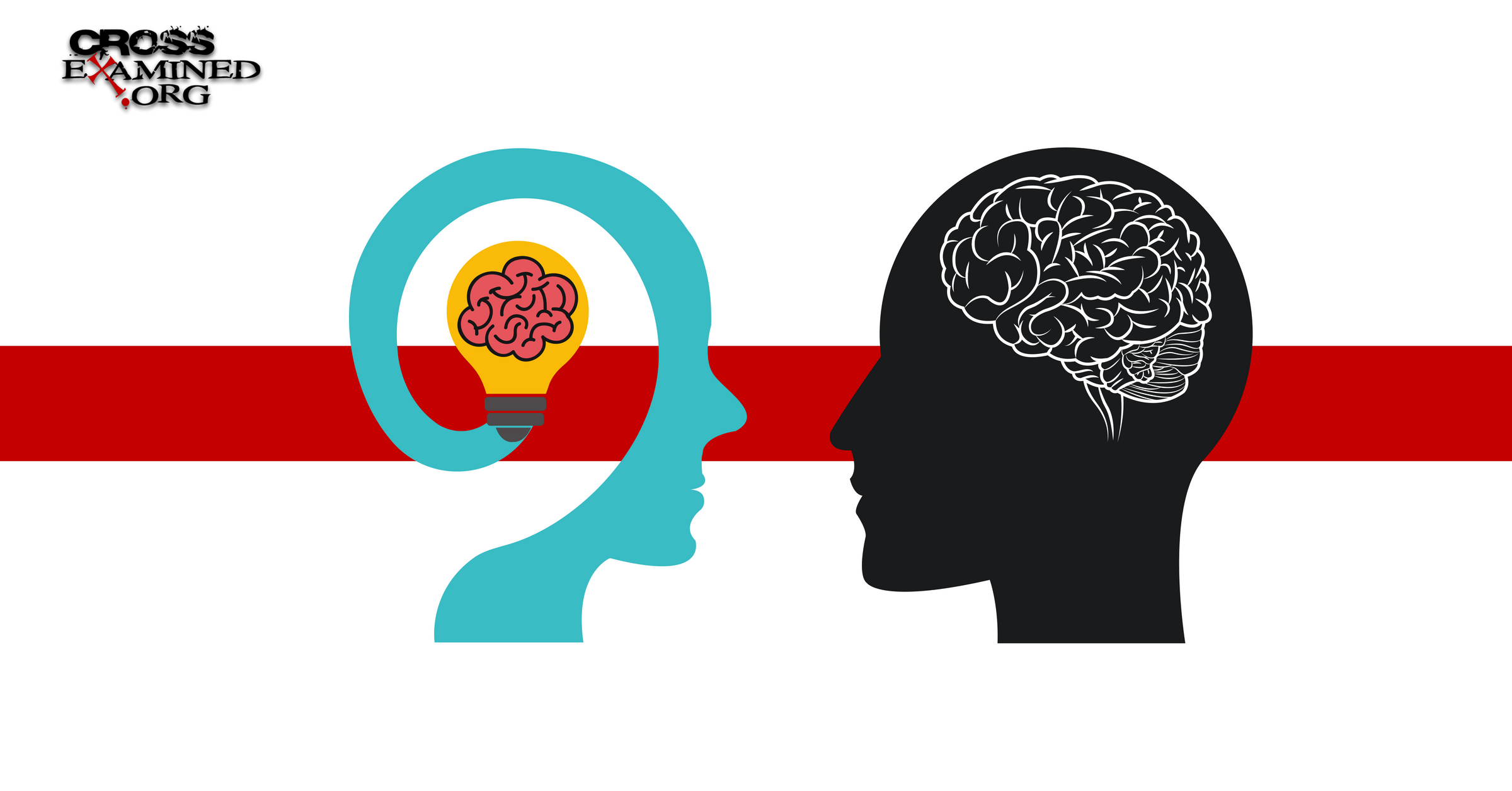By Evan Minton
C.S Lewis once wrote “You don’t have a soul, you are a soul. You have a body“.[1] Most Christians believe that we are not merely physical bodies, but that we are immaterial entities that live inside our bodies. We are embodied spirits. This view is known as Substance Dualism. The Bible very clearly teaches substance dualism (see, for example, 1 Samuel 28, 2 Corinthians 5:6-8, Philippians 1:20-22, 2 Corinthians 12:2-4), so if you believe the Bible is divinely inspired and inerrant, then you ought to be a substance dualist. However, how would you demonstrate the reality of the soul to someone who doesn’t believe The Bible is divinely inspired? Quoting passages to prove that souls exist would do little good when talking to an atheist or an agnostic.
Fortunately, there are philosophical arguments we can draw on for the existence of the soul. One such argument is The FreeThinking Argument which I briefly surveyed in my blog post “5 Arguments For The Existence Of Free Will”. However, another argument reasons to the soul’s existence from the law of identity. This logical principle states that if you’re considering two objects, and every single property both objects have are in common, and there is literally nothing to distinguish the two, the most logical inference is that they are one in the same. That is to say, the two things really aren’t two things after all, but one thing. On the other hand, if the two things do have at least one property that distinguishes them, then the two things are totally separate entities.
In syllogistic form, the argument goes like this:
1: If the mind is identical to the brain, then whatever is true of the brain is true of the mind and vice versa.
2: There are things true of the mind that are not true of the brain.
3: Therefore, the mind and brain are not identical.
This is a logically valid argument. The conclusion follows from the premises by the rule of modus ponens. In order for the conclusion to be justifiably reached, we must affirm that both premises are true. What reasons can be given in defense of these premises?
Premise 1: If The Mind Is Identical To The Brain, Then Whatever Is True Of The Mind Is True Of The Brain and Vice Versa.
The premise rests on the law of identity. The physicalist (i.e the person who believes that people don’t have souls) must prove that when one is talking about the “brain” and when one is talking about the “mind”, they are talking about the same object. In order for them to really be one in the same, any property that the brain has, the mind must have. Any property the mind has, the brain must have. If physicalism is true, the brain must have properties A, B, C, D, E, F, G, and the mind must have properties A, B, C, D, E, F, G. Moreover, there must be no property or properties, H, I, and/or J which exists in one but not in the other. For if properties H or I can be found in one but not in the other, then this shows that they are different entities.
Imagine an alien were to visit from a faraway galaxy and he asked an Earthling who the current president of the united states is. The Earthling tells the alien that the current president is the former host of the TV show The Apprentice. Furthermore, this Earthling later learns from another person that The Apprentice only had one host prior to Arnold Schwarzenegger, Donald Trump. So, if the current president is the former host of The Apprentice, and the former host of The Apprentice is Donald Trump, then the alien would rightly conclude that the name of the current President is Donald Trump. He also learns that Trump is a Caucasian man and that it was a Caucasian man who previously hosted the television show.
Now suppose that this alien knows nothing of how the U.S government works and doesn’t know that a President can only serve a maximum of 8 years. He comes back 20 years later and asks someone who the current U.S President is and the Earthling tells this alien that the president is an Asian Woman whose previous trade was a movie actress, like Reagan. The alien takes into account the facts learned before, namely “The current president is the former host of The Apprentice“, “The current president is a man”, “the previous host of The Apprentice is a man”, and contrasts them with the new information that the current president is an Asian Woman. This is a distinguishing property. The alien concludes from this that Donald Trump must no longer be the current president and that the current president is an entirely different individual, an individual who did not host The Apprentice.
In the above illustration, the alien never actually saw pictures or videos of both of these U.S Presidents. He simply logically inferred based on the law of identity that Donald Trump was the president during his first visit, but that someone else became president before his second visit.
Donald Trump had properties (A) Prior host of The Apprentice, (B) Is U.S President, (C) is Caucasian, (D) is a man.
Years later, the alien found a person who (E) is U.S President, (F) an Asian woman, (G) was a Hollywood actress, (G) never hosted The Apprentice.
E, F, and G, are incompatible with A, C, and D. On this basis, the alien concludes they aren’t the same person. They do not have 100% of their properties in common.
Or another illustration: suppose your wife called you on the phone and said that she bought a bag of red fruit and set them on the counter. You come home to find red apples sitting on the table. You infer that the apples were the fruit your wife was referring to because (A) apple is a fruit, and (B) the apples are red. Your wife’s description and your observation connect to tell you that what your wife was talking about on the phone and what you’re now seeing with your own eyes are one in the same thing. Now, if you came home and found Granny Smith apples, you would think something is up. Although apples are a type of fruit, there’s a property that distinguishes them from the fruit your wife described on the phone, namely the color. You would infer that either your wife was lying, she’s color blind, or she bought two kinds of fruit and the fruit you’re looking at isn’t the kind she was talking about on the phone. But you would never say that the fruit you’re looking at and the fruit your wife talked about on the phone are the same type of fruit because they do not share 100% of the same properties in common. There is at least one property to distinguish them.
It can be stated simply: If X is identical to Y, then whatever is true of X is true of Y and vice versa. But if something is true of Y that is not true of X, then X is not identical to Y.
Premise 2: There Are Things True Of The Mind That Are Not True Of The Brain.
Now we come to the most crucial premise. Is the mind like the green apples and an Asian woman in the above illustrations? Do they have distinguishing properties that would lead us to conclude that are two distinct entities? I believe they do.
The mind has mental properties, such as the property of feeling sad, happy, angry. The mind thinks “about” things. For example, when I go for walks with my dog, I think “about” God, Jesus, philosophy, science, apologetics, or how lovely the trees in my yard looks. Sometimes I think “about” my childhood. The mind has the property of “aboutness” to it. The mind also has the property of first-person perspective. I know myself more intimately than anyone else in the world. I know first-hand what it’s like to feel my own happiness, my own sadness, my own anger, my own anxiety. I know what it’s like to be me. Moreover, the mind contains these things called beliefs, and beliefs can be either true or false.
What about the brain, that physical organ that sits inside our skulls? Does the brain have these properties? No. The brain is never “about” anything. A neuroscientist could hook me up to a machine that could show in exact detail every physiological phenomenon that are going on inside my brain, and never once will he see any of my thoughts. I could be thinking about Pokemon Battle Strategies, and the neuroscientist wouldn’t be able to point to a group of neurons and tell his colleagues “You see that? Those neurons are about Pokemon Battle Strategies”. He would never be able to locate my knowledge of The Bible or of Natural Theology argument. The neuroscientist couldn’t put his finger on the screen of the machine and say “Here’s The Kalam Cosmological Argument!” Even if they cut open my brain and put every molecule under a microscope, they wouldn’t find any property of “aboutness” anywhere. But if the mind is the brain, and mind is undergoing various thoughts, one ought to be able to locate and discern those thoughts if they can simply know what physical processes are going on in my brain, right?
It is also impossible for someone studying a person’s brain to have that first-person perspective. He could have Bob hooked up to a machine to show all of the physical processes currently going on in his brain. The doctor could then hit Bob’s toe with a hammer. The machine would register a pain signal going from Bob’s foot to his brain, indicating that he is experiencing pain, and the doctor would rightly conclude that Bob is in pain. Nevertheless, the doctor would not know what it is like for Bob to experience that pain. He doesn’t have the first-person perspective of the hammer pain. Now, one may object “But Bob could retaliate and hit the doctor on the foot”. True, but that would only result in the doctor having the first-person experience of his own pain. He still wouldn’t have first-person knowledge of Bob’s pain. The doctor might infer that this is what it was like when he struck Bob. In fact, this seems obvious. We all seem to be able to empathize with someone who is going through physical pain. We say “I’ve been there” or “I know what that’s like”. But this is merely a logical inference linking two independent experiences. We don’t really know what it’s like for that person from their first-person POV. We can only infer what it’s like for them on the basis of what it was like for us.
I can infer what it’s like for Bob to have a toothache on the basis of my own experience of tooth-aches, but I do not and cannot partake in Bob’s firsthand experience of tooth pain. The most advanced technology in the world could only tell you the physiological processes occurring when Bob experiences things, but it would never let you step into Bob’s shoes and have that experience yourself.
Now let’s consider beliefs. Beliefs can be true or false, but brain states cannot be true or false. A brain state is just a brain state. It simply is what it is. A neuroscientist can’t hook me up to an EEG and tell me “You know what you’re doing right now? You’re having a false brain state. Cut it out.” This shows that beliefs and brain states are not identical. The thought I’m having can be true or false, but the electrochemical process that occurs when I’m having the thought cannot be true or false.
So, to sum up:
The Mind’s properties — (1) Aboutness, (2) first-person POV, (3) has beliefs that are true or false.
The Brain — (1*) Lacks aboutness, (2*) can only have physiological processes associated with the 1st person POV observed, (3*) has physical states that cannot be either true or false (they are what they are).
Whatever properties they might have in common, it is indisputable that one has properties the other doesn’t have, thus the second premise is true.
Conclusion: Therefore, The Mind Is Not Identical To The Brain.
Since both premises are true, the conclusion follows by the law of modus ponens.
Objection 1: Whenever Something Occurs In The Mental Life, There Are Neurological Processes Occurring In The Brain That Go Along With It. This Shows That The Mind Is Really Just The Brain.
The primary argument for physicalism is that whenever mental events occur in the mind, there are physical events happening in the brain that occur simultaneously. Take the phenomenon of fear. When you have fear, undoubtedly there is brain activity that is correlated with the experience of fear. Physicalists will also point out that certain mental diseases, like Alzheimer’s, affect the brain, but as a result of affecting the brain, the mind is also affected. People with this dreadful disease lose more and more of their ability to think clearly and remember. Eventually, they even forget who their relatives are. Doesn’t this loss of brain/loss of mind correlation show that the mind is the brain?
I don’t think so. For one thing, it’s important that you don’t miss that my arguments given for premise 2 presuppose that there’s a correlation of events between the brain and the mind. If you re-read those paragraphs again, you’ll see that.
Secondly, this objection doesn’t even address my points that the mind has the property of aboutness and the brain does not (no neuron, cell, or electrical impulse is “about” any of your thoughts), nor it does address my point that even an exhaustive knowledge of the physical process of the brain wouldn’t show you that person’s first-person point of view. This objection refutes neither premise of the argument.
Thirdly, mental diseases like Alzheimer’s affecting one’s mental life doesn’t necessarily point to the conclusion that they are one in the same. At most, this just shows that the brain and mind can affect or influence one another. In a lecture at the Truth For A New Generation conference in 2012 titled “The Argument For The Soul”, J.P Moreland gave the following illustration. Suppose you’re in a car that has defected doors that won’t open, and the seatbelt can’t be released either. Wouldn’t it be the case that your mobility would be limited by where you can drive the car? Yes. You could go anywhere you wanted to except for places where the car couldn’t fit. Suppose something happened to the steering wheel that caused it to be stuck turned left. In this case, you’d be stuck driving around in circles.
Now suppose that you wreck the car, and you do so in such a way that the seatbelt snaps, the windshield shatters, and you get hurled out of the vehicle. No problems that existed with the vehicle would matter anymore because you’re not inside of it anymore.
In a similar way, while we’re stuck in these earthen vessels, we are mentally limited by our brains and bodies. If the brain is malfunctioning, that’s going to cause our minds to malfunction as well even though our minds are distinct. Now, when the mind (soul) leaves the body, it’s no longer constrained by the physical defects of the brain it depended on. Just as the physical defects of the car didn’t matter once our driver was able to get out.
Philosopher William Lane Craig answered it this way: “Noble Prize winning neurologist Sir John Eccles lecture on the relationship between the mind and the brain. He said that the mind and the brain are like a pianist and his piano. In order to produce music the pianist must have a finely tuned piano, and then he can produce the music. But if the piano is out of tune, even though the musician knows how to play the piece correctly, the music will be discordant, and he will not be able to produce the beautiful music. Similarly, Eccles said, the mind and the brain work together to produce thought. If the brain is malfunctioning or injured or impaired then thought will be impaired; the soul will not be able to think properly. Its instrument will be impaired and so it cannot think correctly.” [2]
So, to conclude: brain-state correlation with mental events doesn’t prove the mind is the brain. It could just mean there’s a two-way relationship of cause and effect between them. There’s a reason my blog’s slogan is “Using the brains that God gave us”. That reason is that I believe we do indeed use our physical brains to think, just a pianist uses a piano to make music.
Objection 2: The Mind-Body Interaction Problem
Some physicalists try to argue that substance dualism is false because of what is known as “The Mind-Body Interaction Problem”. This dilemma stated is that there is no way to explain how an immaterial thing like the soul can cause effects in the brain and body and vice versa. How exactly does this mysterious substance called “The soul” cause effects in my physical brain? What mechanism is there for the soul to cause the brain to cause my fingers to type this sentence? No one can give an answer. I certainly can’t at least.
Now, one could perhaps simply appeal to mystery. As long as we have good grounds for affirming that the soul and brain do indeed interact, we can simply shrug our shoulders at the how.
On the other hand, some actually make a more potent argument than simply saying “You can’t explain how the soul and body interact, so substance dualism must be false.” Some frame the counterargument to substance dualism this way:
(A1) A soul can interact with a body only if the interaction is in virtue of the transference of motion from the soul to the body.
(A2) Transference of motion from a soul to a body is impossible (because a soul does not have motion).
(A3) Therefore, a soul cannot interact with a body.
Dr. Jacobus Erasmus explains that first step asserts that for A to causally interact with B, a transference of motion from A to B has got to happen, such as through a collision or some other kind of impact. Now, many philosophers, (e.g Jonathan Barnes, Joshua Hoffman, and Gary Rosenkrantz), have noted that (A1) presupposes the following erroneous principle:
(A4) For any two objects A and B and some property F, if A causes B to be F, then A is F.
Dr. Jacobus Arasmas explains that “According to (A4), if a soul causes a body to be in motion, then the soul must be in motion. It is, thus, easy to see why (A1) presupposes (A4). Unfortunately, (A4) is demonstrably false. A lump of clay, for example, can be caused to be square by a non-square object, such as a hand or a rolling pin. Or consider the Law of Gravity, according to which two pieces of matter can accelerate toward each other (or gain motion) without motion being transferred from one to the other. Hence, since (A4) is false, (A1) is false.” [3] As any philosopher will tell you, it only takes the falsification of one premise to make an argument worthless. So even if A2 stands, A3 doesn’t follow because A1 is fallacious.
So, although we still don’t know how the mind/soul causes effects in the brain/body, we certainly don’t have any positive reason (as the above syllogism attempts to show) that such an interaction is impossible. As long as the arguments for substance dualism are sound, we can simply leave this issue an open question. Just as if
Kirk MacGregor’s argument for middle knowledge is sound, we can leave the issue of how God knows CCFs an open question.
Conclusion
Other objections to the argument could be addressed, but for the sake of keeping this article a reasonable length, I only opted to respond to the two primary objections most frequently brought up by physicalists. Any other objections can be saved for future articles. It seems that the identity argument for the soul is sound, which gives us good extra-biblical grounds for being substance dualists.
Notes
Evan Minton is a Christian Apologist and blogger at Cerebral Faith (www.cerebralfaith.blogspot.com). He is the author of “Inference To The One True God” and “A Hellacious Doctrine”. He has engaged in several debates which can be viewed on Cerebral Faith’s “My Debates” section. Mr. Minton lives in South Carolina, USA.
Original Blog Source: http://bit.ly/2SCAqUb












Leave a Reply
Want to join the discussion?Feel free to contribute!